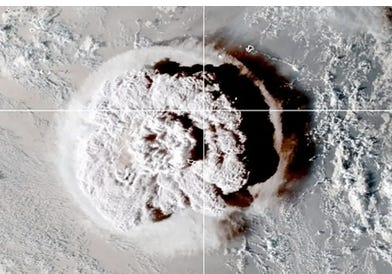The Real Reason It Got Hot in 2023
The awesome impact of the Hunga Tonga Undersea volcanic eruption in 2022
Update 8/30/24 - adding a great link to all about volcanoes:
The looping video above shows an umbrella cloud generated by the underwater eruption of the Hunga Tonga-Hunga Ha’apai volcano on Jan. 15, 2022. The GOES-17 satellite captured the series of images that also show crescent-shaped shock waves and lightning strikes. u003cstrongu003eCredits: NASA Earth Observatory image by Joshua Stevens using GOES imagery courtesy of NOAA and NESDISu003c/strongu003e
the Hunga Tonga volcano’s tremendous expulsion of water vapor is the cause of this year’s global warming - excerpted from my Aug.3 post
NASA: “When the Hunga Tonga-Hunga Ha’apai volcano erupted on Jan. 15, it sent a tsunami racing around the world and set off a sonic boom that circled the globe twice. The underwater eruption in the South Pacific Ocean also blasted an enormous plume of water vapor into Earth’s stratosphere – enough to fill more than 58,000 Olympic-size swimming pools. The sheer amount of water vapor could be enough to temporarily affect Earth’s global average temperature. (emphasis mine)
The eruption not only injected ash into the stratosphere but also large amounts of water vapor, breaking all records for direct injection of water vapor, by a volcano or otherwise, in the satellite era. …The excess water vapor injected by the Tonga volcano … could remain in the stratosphere for several years. This extra water vapor could influence atmospheric chemistry, boosting certain chemical reactions that could temporarily worsen depletion of the ozone layer. It could also influence surface temperatures … since water vapor traps heat.”
“We’ve never seen anything like it,” said Luis Millán, an atmospheric scientist at NASA’s Jet Propulsion Laboratory in Southern California.
it gets worse - Jeff Childer’s Coffee&Covid: “Over the next year it would turn out that NASA badly underestimated the amount of water Hunga Tonga vaporized into the atmosphere. Current estimates are three times higher than the original: scientists now think it was closer to 150,000 metric tons, or 40 trillion gallons, of super-heated water instantly injected into the atmosphere. Talk about a greenhouse. Water vapor — humidity — is a much more effective greenhouse gas than carbon dioxide.”
H2O vapor and the ‘greenhouse effect’
The American Chemical Society's ACS Climate Science Toolkit cuts right to the chase in an excellent analysis on its website,
...water vapor is the largest contributor to the Earth’s greenhouse effect
From MIT - With all the attention given to humans’ climate-warming carbon dioxide (CO2) emissions, you might be surprised to learn that CO2 is not the most important greenhouse gas affecting the Earth’s temperature. That distinction belongs to water.
We can thank water vapor for about half of the “greenhouse effect” keeping heat from the sun inside our atmosphere.1 “It’s the most important greenhouse gas in our climate system, because of its relatively high concentrations,” says Kerry Emanuel, professor emeritus of atmospheric science at MIT. “It can vary from almost nothing to as much as 3% of a volume of air.”
Compare that to CO2, which today makes up about 420 parts per million of our atmosphere—0.04%—and you can see immediately why water vapor is such a linchpin of our climate system.
normally only posting on Thursdays, but sometimes I just have to throw in some extras…stay tuned for Nov. 30 - Part 2 of “How Pseudo Science is Destroying our Civilization”








It sounds both scientific and reasonable. (And it is something God could do anytime he wanted to.)
LoCali resident here, weighing in well after the fact. The heat-trapping effect is something I didn’t really consider, but I did think then that the eruption’s effect would likely bring about increased rainfall on the west coast of the US - mired in drought at the time - and it seems quite possible that that it was a decisive contributing factor to the increased precipitation in Cali of the last two years. That much H2O had to go somewhere, and I’m glad some of it landed here.